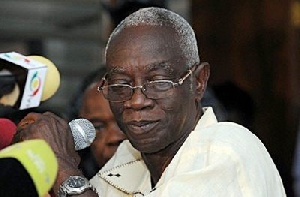The Chairman of the Electoral Commission, Dr. Kwadwo Afari-Djan, Thursday confirmed to the Supreme Court hearing the presidential election petition, that voters whose fingerprints could not be captured either through permanent trauma or temporal traumas were still verified by the biometric device by “Face Only,” and that for such people, their verification was completed when their pictures appeared on the biometric device screen.
Dr. Afari-Djan also confirmed to the court that, by law and agreement, everyone was supposed to vote only after being verified by the biometric verification device and that no exceptions were made to this rule.
This confirmation of Dr. Afari-Djan reiterates the position of the petitioners and star witness of the petitioners, Dr. Mahamudu Bawumia, who told Counsel for the National Democratic Congress (NDC), Tsatsu Tsikata that disabled voters and other face only voters were still verified by the biometric device through their face only and that the justification that those who voted without being verified by the biometric device were disabled / FO voters could not be sustained.
Dr. Afari-Djan proceeded to state that because every voter was supposed to be verified by the biometric device as had been agreed to by the various political parties, and as stated by law, the commission ordered presiding officers not to fill the question “C3” which sought to know how many voters at the polling station voted without being verified by the biometric device.
However, Dr. Afari-Djan could not tell the court whether the instruction on the question “C3” was verbally indicated to the presiding officers and electoral officials or whether the commission officially wrote to the electoral officers informing them of the directive.
Indeed, Dr Afari-Djan noted that he could not tell what the EC’s training officials during the training sessions had told presiding officers with regards to how to fill the section “C3”.
In another interesting confirmation, Dr. Afari-Djan confirmed the position of Dr. Mahamudu Bawumia who insisted during his examination in chief and cross–examination that, it was mandatory for the presiding officers to fill in all sections of the pink sheet at the times defined for each section and that failure by any presiding officer to fill in a particular section at the time defined would be irregular.
Leading evidence on the processes presiding officers had to undertake at the polling station, Dr. Afari-Djan stated “the ballot information section and information about the register and other lists should be filled before voting begins; if the presiding officer fails to do this, it is an irregularity. In the same way, there are sections on the form which should be filled before the box is opened, once again if the presiding officer fails to fill this section (ballot accounting section), it is an irregularity”
This confirmation from Dr. Afari-Djan seems to back the petitioners’ case who argue that it is not possible to claim that the information on portions of the pink sheets arose out of errors as a result of intentions of the Presiding officers to pick numbers from one section of the form into another section because the various sections of the form were to be filled at specific times.
Again, it backs the petitioners’ on their insistence that failure to fill certain sections of the form especially the ballot accounting section of the form was in itself an irregularity.
General News of Friday, 31 May 2013
Source: NPP Communications Directorate

















